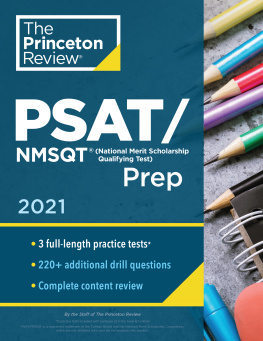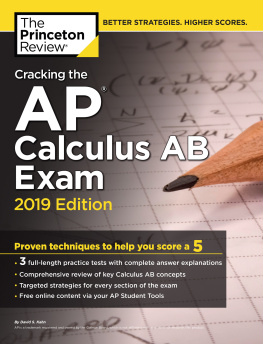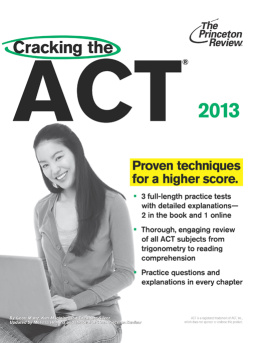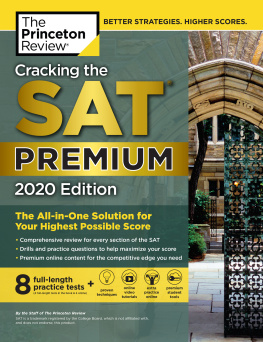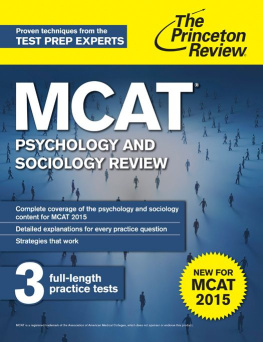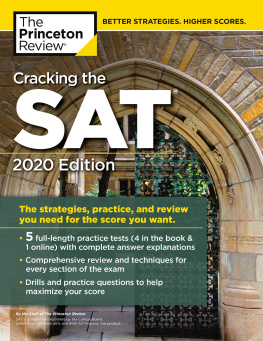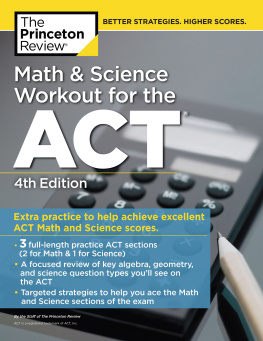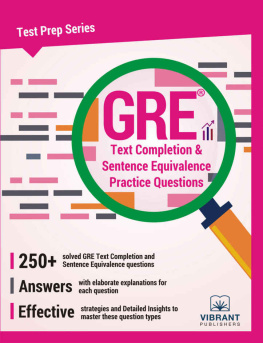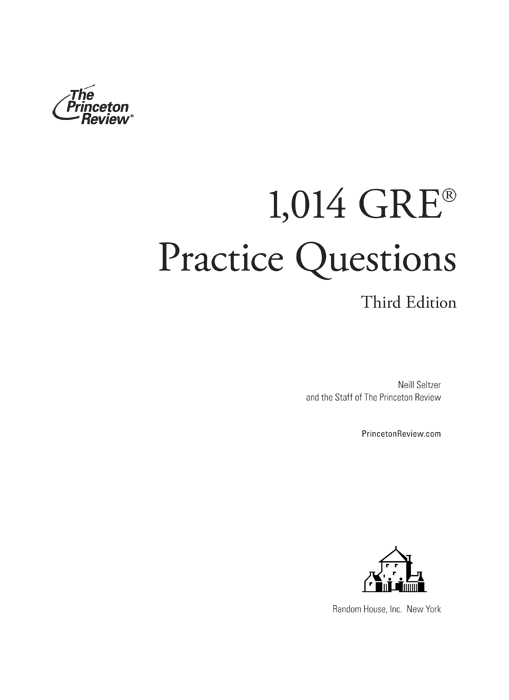
Editorial
Seamus Mullarkey, Editorial Director
Laura Braswell, Senior Editor
Selena Coppock, Editor
Calvin Cato, Editor
Random House Publishing Team
Tom Russell, Publisher
Nicole Benhabib, Publishing Manager
Ellen L. Reed, Production Manager
Alison Stoltzfus, Associate Managing Editor
The Princeton Review, Inc.
111 Speen Street, Suite 550
Framingham, MA 01701
E-mail:
Copyright 2011 by The Princeton Review, Inc.
All rights reserved. Published in the United States by Random House, Inc., New York, and in Canada by Random House of Canada Limited, Toronto.
All questions in the book were created by the authors.
The Princeton Review is not affiliated with Princeton University.
eISBN: 978-0-307-94539-6
ISSN: 1943-4855
Editor: Liz Rutzel
Production Editor: Meave Shelton
Production Coordinators: Mary Kinzel, Deborah Silvestrini, and Ryan Tozzi
Illustrations by: The Production Department of The Princeton Review
v3.1
Acknowledgments
The following people deserve thanks for their help with this book: Lauren Akamine, Jonathan Arak, Forrest Bankston, Maralyssa Bann, Laura Braswell, Adam Cadre, Ed Carroll, Vanessa Coggshall, Joe Consiglio, Cynthia Cowan, Adam Davis, Cathy Evans, John Fulmer, Peter Hanink, Christopher Hinkle, Dara Hogue, Karen Hoover, Kim Howie, Jary Juliano, Kimberly Kendal, John Kim, Stephen Klosterman, Anna Konstantatos, Rebecca Lessem, Sionainn Marcoux, Joan Martin, Melanie Martin, John Massari, Mike Matera, Lisa Mayo, Seamus Mullarkey, Aaron Murray, Andrew Nynka, Abolaji Ogunshola, Jerome ONeill, Emma Parker, Emillie Parrish, Adam Perry, Doug Pierce, Nicole-Henriett Pirnie, Krista Prouty, Curtis Retherford, Debbi Reynolds, Lisa Rothstein, Liz Rutzel, Meave Shelton, David Stoll, Phil Thomas, Scott Thompson, Kerry Thornton, Shawn Waugh, David Weiskopf, Jonathan Weitzell, Sarah Woodruff, and David Zharkovsky.
A special thanks to Neill Seltzer for conceptualizing this book from start to finish, and to Graham Sultan for helping those conceptions become a reality.
A very special thanks to Adam Robinson, who conceived of and perfected the Joe Bloggs approach to standardized tests and many of the other successful techniques used by The Princeton Review.
Contents

SO YOUVE DECIDED TO GO TO GRAD SCHOOL
Much like the SAT that you probably took to get into college, the GREor the Graduate Record Exam, as it is officially knownis required for admissions by many graduate programs. GRE test takers include future engineers, historians, philosophers, psychologists, nurses, even veterinarians. In short, the GRE is used by just about any graduate program that is not medical school, law school, or business school. It may seem odd that a student who is applying for an advanced degree in architecture must take the same exam as a student applying for a degree in comparative literature. In many respects, it is. Because a wide variety of graduate programs rely upon the GRE rather than their own proprietary exam, GRE results are used in a wide variety of ways.
Some programs simply have a minimum combined score that all applicants must achieve. Other programs, such as a creative writing program, care far more about the Verbal score than they do about the Math score. One would think that engineering programs would care more about the Math score, as some do, but most engineering applicants score in the very highest percentiles on the GRE quantitative section and therefore Verbal scores, not Math, become a more effective tool for comparing one candidate to another.
If you are frustrated that the skills you have to dust off and polish for the GRE bear little resemblance to the subjects you will be studying in grad school, remember three things. First, the GRE is not a content test. It does not test a body of knowledge, like U.S. history or French. It is designed to test a very specific way of thinking. Second, taking the GRE is a skill, and like any other skill, it can be learned. That is what this book and Cracking the GRE are all about. With diligence and practice you can learn everything you need to know for the GRE, and you can do it in a surprisingly short period of time. Far less time, in fact, than it took you to learn physiology, Renaissance poetry, or whichever subject you plan to pursue in your graduate studies. The last thing to remember is that the GRE is only one factor of many that will be considered for admissions, and it is often the easiest to change.
The first task in preparing for the GRE is doing your graduate school research.
There is no such thing as a good GRE score or a bad GRE score. There is only the score you have and the score you need to get where you want to go. The gap between the two represents the amount of work you will have to do in the meantime. If you need an additional 50 points (on the old scale), that shouldnt be too difficult to achieve. Polish up your vocabulary, master the pacing of the exam, and take some practice tests and you should do fine. If you need another 100 points (on the old scale), that will take some more work. Youll need more vocab, youll need to identify and address your gaps on the Quantitative section and youll need more practice. If you can push yourself to do that on your own, this book and access to a few practice tests should be all you need. If you need more than 100 points (on the old scale), or you arent likely to put in the time on your own, you will need a course or a tutor. It all starts with the research. Once you know the score you have and the score you need, you will know how much time you need to put in to prepare for the real test.
How schools weight the scores, assuming they can even answer this question, will differ not only from school to school, but even from student to student. Schools may use GRE scores to validate the verbal abilities of international students with really fantastic essays. GRE scores may be used in lieu of work experience for applicants who are only a year or two out of undergrad, or as a more recent snapshot for adult students returning to school after a decade or so. Mostly they are just there so that schools have an apples-to-apples comparison of applicants with a wildly divergent range of undergrad, work, and life experiences. Also, most applicants are pretty qualified. Often the scores are there as an easy way to narrow down the pool.
How your program uses your scores will determine quite a bit about how you prepare for the test. The following is a list of questions to ask when you call up your target school.
How Much Do GRE Scores Count?
Schools generally do a pretty good job of telling applicants what is required (application, recommendation, essays, portfolios, test scores, transcripts), but how one factor is weighed against another is a murky science. Typically a GPA or current work experience will weigh far more heavily than a GRE score. On the other hand, if your GPA is on the low side, you will want your GRE scores to be as high as possible to prove that you can do the work.


